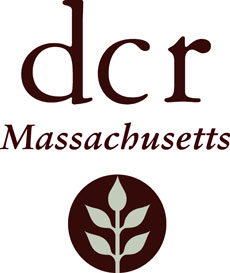- Department of Conservation & Recreation
Media Contact
Ilyse Wolberg, DCR Deputy Communications Director
Boston — The Massachusetts Department of Conservation and Recreation (DCR) is marking Native American Heritage Month with the announcement of a newly created position to help foster meaningful relationships and improve the understanding and collaboration between the state’s conservation agency and Indigenous communities across Massachusetts. Leah Hopkins, an enrolled member of the Narragansett Indian Tribe with nearly two decades of experience building bridges between institutions and Tribal Nations, will serve as DCR’s new Indigenous People’s Partnership Coordinator.
As the first Indigenous Peoples Partnership Coordinator, Hopkins will be DCR’s liaison to the state’s many Indigenous communities and Tribal Nations. She will also launch the First People, First Stewards Partnership, a new effort by DCR to better acknowledge and understand the role of the lands the agency stewards in the cultural continuity, well-being, and sovereignty of Indigenous Peoples. Hopkins will focus on helping DCR build relationships with Indigenous communities and Tribal Nations and forging connections between DCR land management, traditional ecological knowledge and Indigenous culture. She will work to expand the agency’s engagement with Indigenous people and to elevate the Native voice in the DCR’s stewardship of the land and waters of Massachusetts.
“It’s more important than ever that we create pathways for Indigenous communities to directly influence the stewardship of public lands and strategies to combat climate change,” said Energy and Environmental Affairs Secretary Rebecca Tepper. “Leah Hopkins’s dedication and passion will expand our understanding of traditional ecological knowledge, improve our relationships with diverse Native cultures, and advance our environmental justice priorities.”
“Centering the voices of Tribal and Indigenous communities is at the core of environmental justice” said Undersecretary of Environemtal Justice and Equity, María Belén Power. “Through the creation of DCR’s new Indigenous People’s Partnership Coordinator and their new programs, we will ensure Tribes and Indigenous communities are leading the way and shaping the solutions to the climate crisis.”
“As the steward of more than 450,000 acres of public lands across Massachusetts that are filled with a rich cultural history, DCR has an obligation to work hand in hand with our Indigenous and Native communities – the first stewards and caretakers of our state’s lands and waters – to preserve these treasured spaces for the well-being of all,” said DCR Commissioner Brian Arrigo. “Leah’s lived experience as a Native person, strong connections to Tribal Nations and Indigenous communities across our state, and her passion for our public lands will be critical to DCR as we work to foster new partnerships and incorporate the Native voice into the stewardship of our natural resources.”
“I am looking forward to the opportunity to work with Tribal Nations across the Commonwealth to center Indigenous voices and concerns with respect to the land,” said Leah Hopkins. “I hope to, in consultation, develop and implement initiatives that will provide Tribal Nations and their citizens with not only access to, but also the opportunity to reestablish relationality with the lands that DCR stewards. I will welcome and nurture relationships between Tribal Nations and the agency, and it will be my responsibility to guide the state to a better understanding of tribal needs and enact actionable steps into the future that are mutually beneficial.”
“It is important to have Native Representation with the Department of Conservation and Recreation in order to bridge the gap between non-native and native peoples and bring a wider understanding of Indigenous people’s connection to the land and the importance of preserving and conserving this land for all to enjoy,” said Troy Phillips, a member of the Hassanamisco Nipmuc Tribe. “No one is more qualified than Leah to serve in this role. She will do an outstanding job of protecting, promoting and enhancing the state’s natural, cultural, and recreational resources with her passion and clear communication skills, and will usher in a new era for DCR.”
Hopkins comes from a long line of subsistence practitioners who have stewarded her tribe’s homelands in Rhode Island. She has spent the last 15 years working to help state and federal agencies, museums, land conservancies and non-profits collaborate with and build partnerships with Tribal Nations and Indigenous communities in Southern New England. She has worked for and with the Nipmuc Nation (both Hassenamisco and Chaubunagungamaug) the Mashpee Wampanoag Tribe, the Stockbridge-Munsee Tribe of Wisconsin, and the Wampanoag Tribe of Gay Head (Aquinnah). She has also consulted on public and private sector engagement with Tribal Nations and developed culturally appropriate programs, lectures, exhibits and performances. Most recently, she worked at the Haffenreffer Museum of Anthropology at Brown University, where she was Manager of Museum Education and Programming, focusing on overseeing a portfolio of events, workshops and lectures that bring Indigenous specialists and voices to museum programming.
Hopkins has a Bachelor of Arts Degree in Anthropology with a concentration on Indigenous Studies from the University of Rhode Island. Hopkins’s husband, Jonathan James-Perry, is a Tribal Councilman for the Wampanoag Tribe of Gay Head (Aquinnah).
Hopkins started her role on November 4. On Wednesday, November 6, she kicked off a series of three “meet and greets” for the community to meet and engage with her at agency parks about Indigenous relationships with our state lands. The "meet and greets” were held at Blue Hills Reservation in Canton on November 6 at Wachusett Visitor Center in Princeton on November 13. The series will continue at Great Falls Discovery Center in Turners Falls on November 20 from 10 a.m. - 12 p.m.
###
